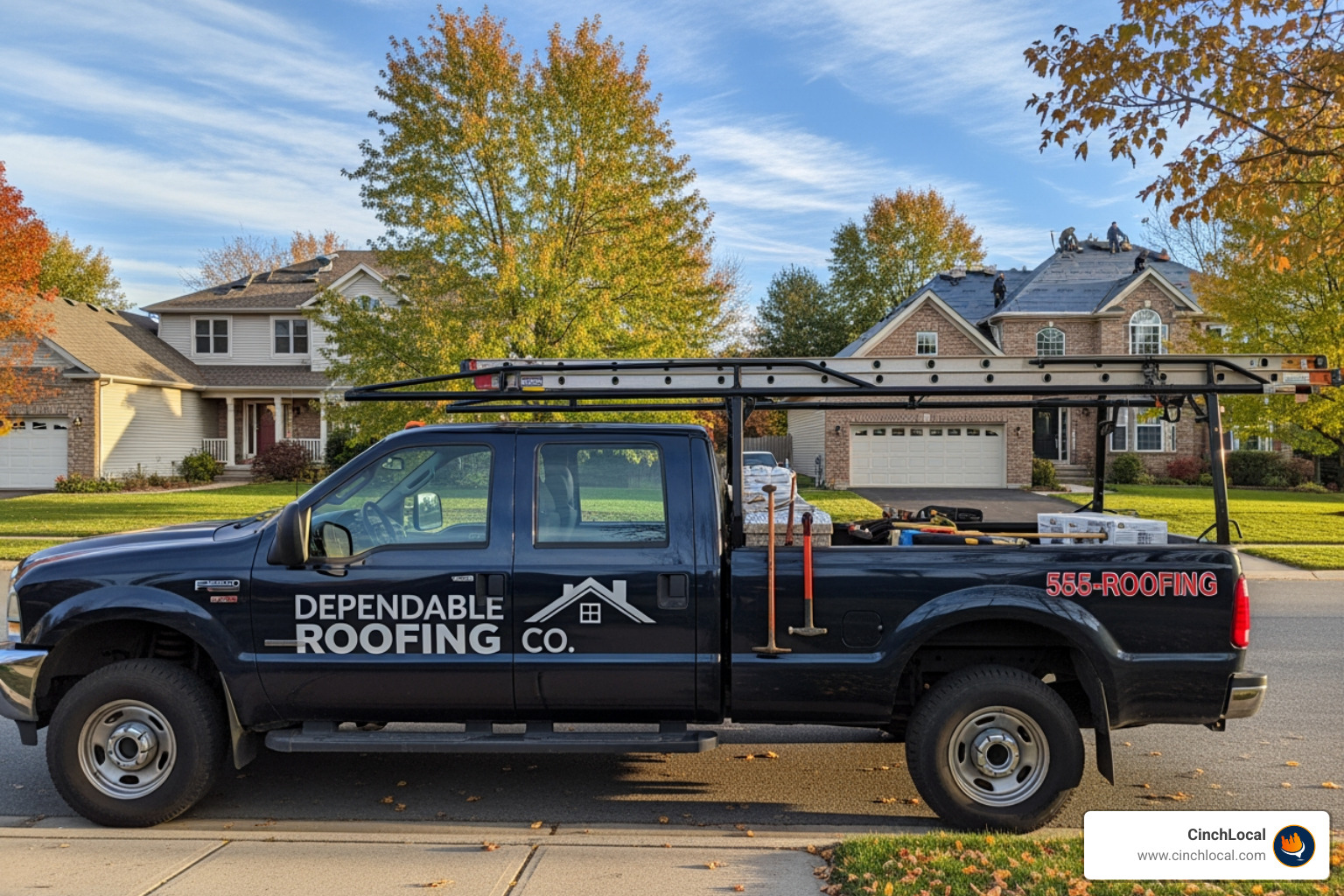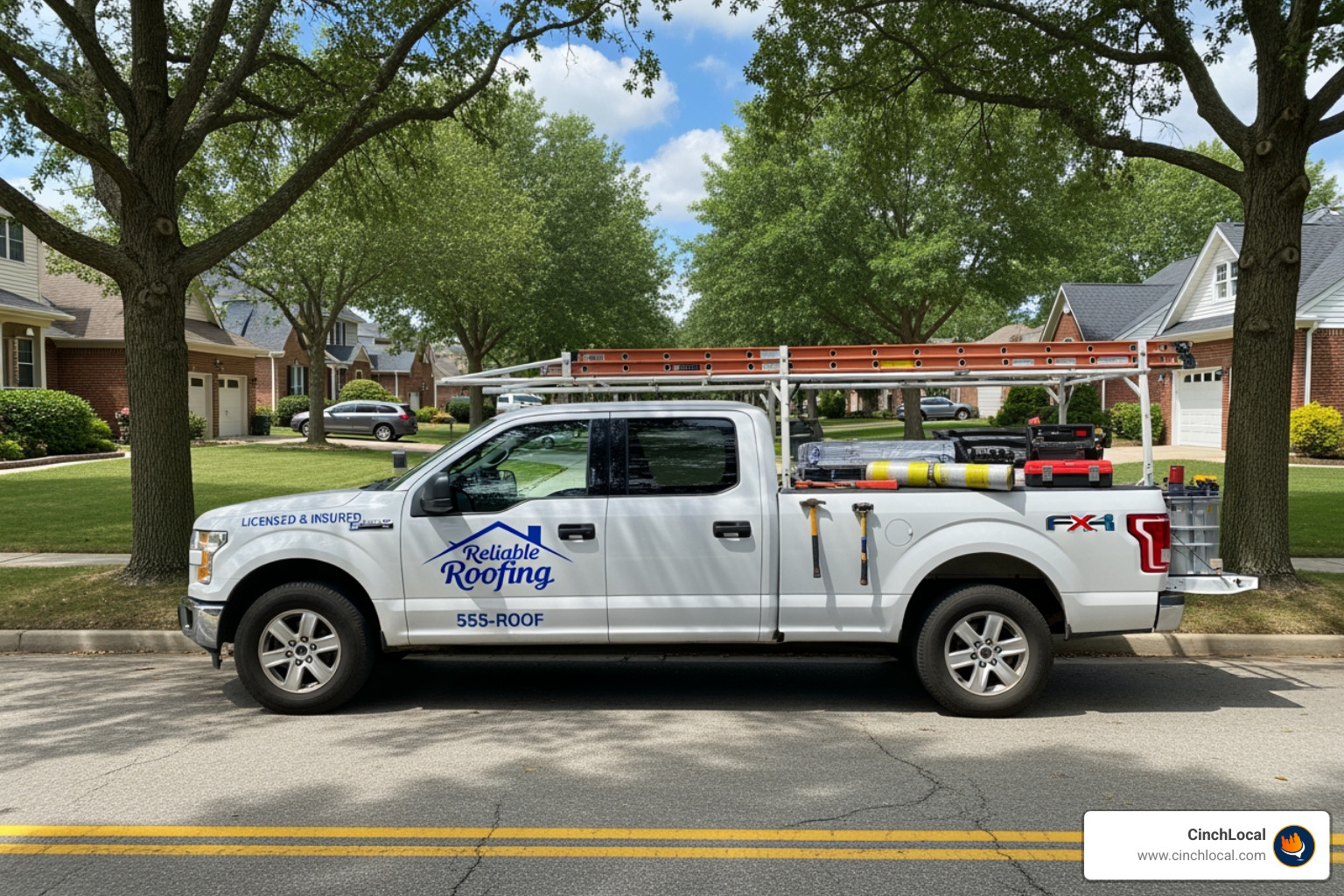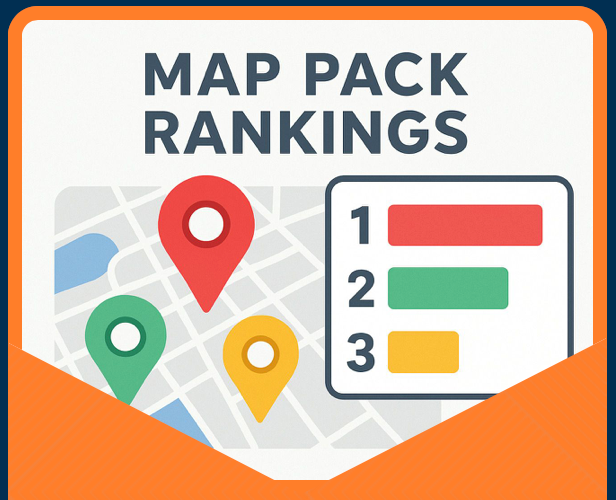
Cary Byrd // Founder of CinchLocal
How to Design a Construction Website That Doesn't Collapse Under Pressure
Why Construction Website Design is Your Digital Foundation
Construction website design is the blueprint for your online success. In today's digital-first world, your website is your 24/7 sales representative, working tirelessly to attract qualified leads and showcase your expertise. For contractors, a powerful online presence is crucial for attracting high-value projects and establishing a reputation that sets you apart from the competition.
Key elements of effective construction website design include:
- Professional Visual Identity: A clean, industry-appropriate design that builds trust.
- Project Portfolio: High-quality images showcasing your best work.
- Mobile Responsiveness: A seamless experience across all devices, as over half of users browse on mobile.
- Fast Loading Speed: Pages that load in under 3 seconds to prevent visitors from leaving.
- Clear Calls-to-Action: Strategic placement of "Get a Quote" and contact buttons.
- Trust Signals: Prominently displayed client testimonials, certifications, and awards.
The construction industry has unique web design challenges. You're selling high-value, complex projects that demand significant client trust. Your website must instantly communicate expertise, reliability, and professionalism.
Many construction companies still use outdated websites that fail to capture leads, creating a massive opportunity for contractors who invest in modern digital strategies. I'm Cary Byrd, CEO of CinchLocal, and I've spent over a decade helping contractors build powerful online presences. My experience has shown me what separates successful contractor websites from those that struggle to convert visitors into customers.
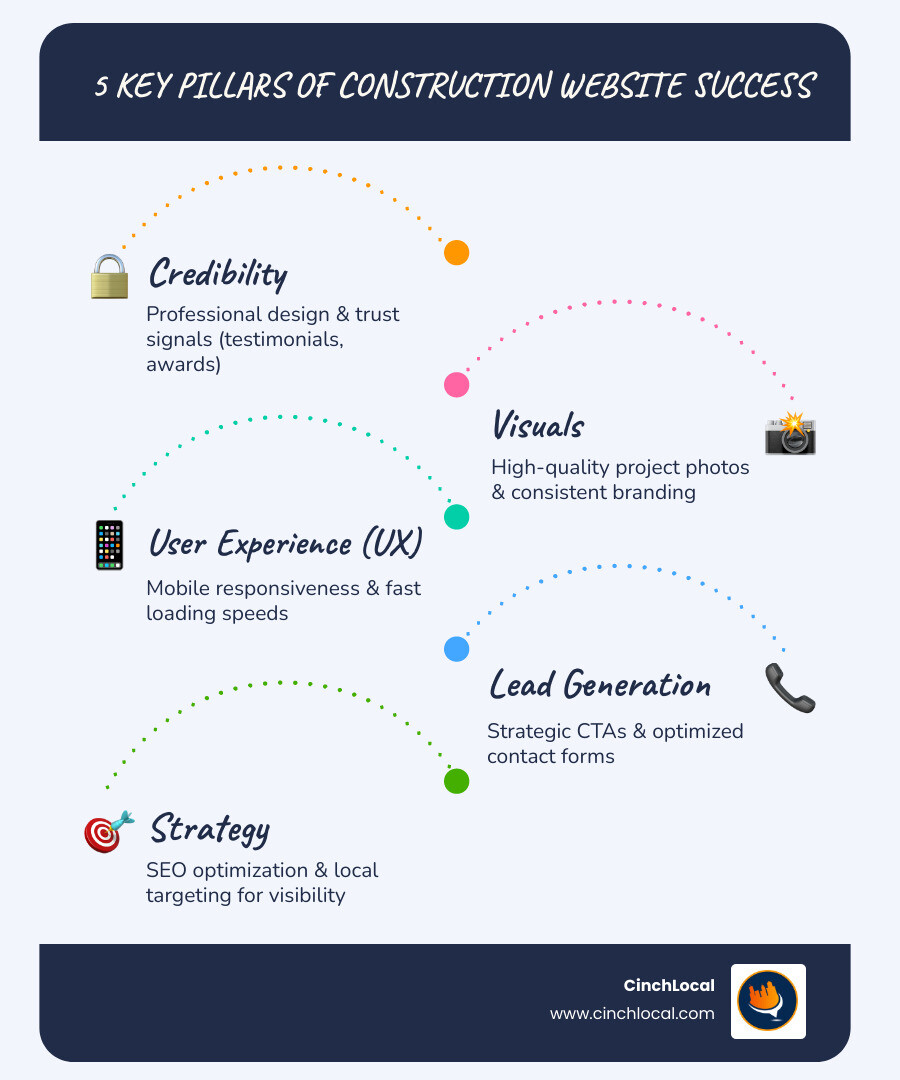
Common construction website design vocab:
Laying the Foundation: The Blueprint for Your Digital Job Site
Think of your construction website as your most important blueprint. It's the foundation of your digital marketing, acting as your most dedicated salesperson. When potential clients need construction work, they search online. Your website is their first impression, and you get one shot to prove you're the contractor they can trust.
A professional website positions you as an industry leader, differentiating you from competitors who still rely on word-of-mouth. It's your digital business card, 24/7 information hub, and primary tool for attracting high-value projects.
What is the Primary Purpose of Your Website?
Your construction website design should accomplish one primary goal: turn visitors into paying customers. A visitor to your site is already interested in construction services; your job is to convince them you're the right choice. Your website does this by establishing expertise, building trust through testimonials and project photos, and making it incredibly easy for them to contact you.
The construction industry's slow digital adoption creates a huge opportunity. A professional website can help you capture significant market share. For more insights, check out this guide on web designs that nail it for construction companies.
Essential Pages Every Construction Website Must Have
Just as a building needs specific rooms, your website needs essential pages to guide visitors.
- About Us: Share your company's story, mission, and team. Mentioning achievements like "over 20 years of experience" builds instant credibility.
- Services: Clearly define what you do. Dedicate sections to each service (e.g., residential, commercial, renovations) with straightforward descriptions and representative photos.
- Project Portfolio: This is your most powerful sales tool. Showcase real projects with high-quality, before-and-after photos. Video walkthroughs and drone footage can add an impressive, immersive dimension.
- Testimonials: Provide the social proof that seals the deal. According to BrightLocal research, 46% of customers trust online reviews as much as personal recommendations. Feature detailed reviews from satisfied clients, using video testimonials for maximum impact.
- Contact: Make it effortless for prospects to reach you. Include your phone number, email, a simple contact form, and your physical address. This NAP (Name, Address, Phone) information is also vital for local SEO.
Framing the Structure: Must-Have Aesthetics and Design Elements
Your website's design creates an instant first impression. An unprofessional site can make potential clients question your ability to handle their project. Construction website design is about balancing professionalism with visual appeal to communicate expertise and keep visitors engaged.
Your site should be an extension of your brand, meeting the expectations of clients investing significantly in your services. Find the sweet spot where your identity shines through industry-appropriate design.
Creating a Professional and Engaging Visual Identity
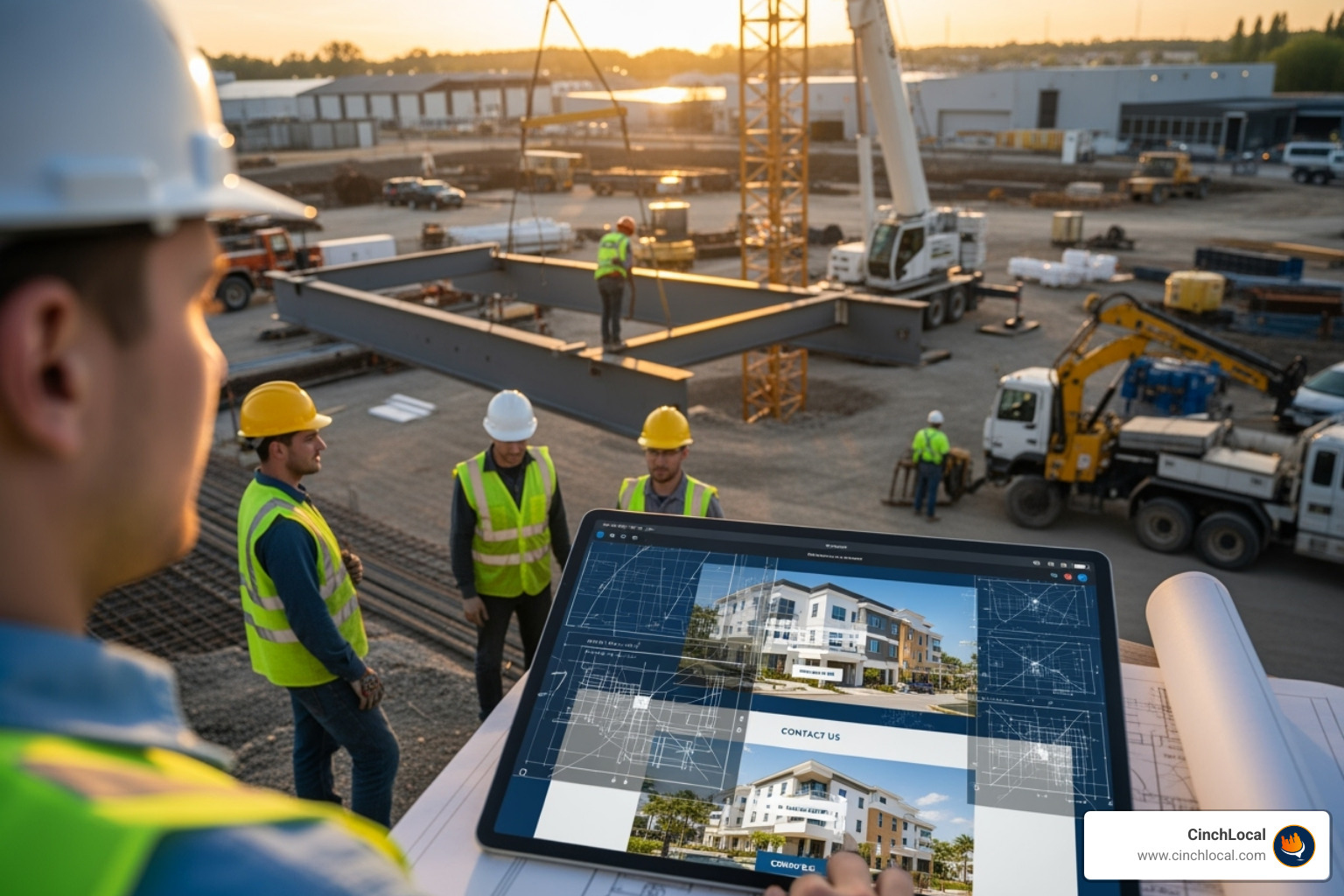
Your visual identity sets the tone. Done right, it builds immediate trust.
- High-Quality Photography: This is non-negotiable. Avoid generic stock photos. Invest in professional photography of your actual work and team. Stunning visuals of completed projects sell your services better than anything else. Drone footage adds a modern touch.
- Consistent Color Scheme: Use clean whites, professional grays, and simple earth tones to create a trustworthy vibe. Your color palette should reinforce your brand on every page.
- Clear Typography: Choose clean, legible fonts. Body text should be effortless to read on any device.
- Simple Navigation: Your menu should be intuitive. Visitors shouldn't have to hunt for your portfolio or contact information.
- White Space: Strategic empty space draws attention to important elements and prevents your site from looking cluttered.
For more ideas, check out these roofing website design ideas to keep your business above the rest , as the principles of strong branding apply across construction specialties.
How to Effectively Showcase Projects and Build Credibility
Your completed projects are your strongest sales tool. Create detailed project pages that function as mini case studies, telling the story of the client's challenge and your successful solution. This narrative approach helps clients envision working with you.
Use high-resolution image galleries with multiple angles, before-and-after shots, and close-ups of key details. Video walkthroughs and drone footage offer an immersive experience that static photos can't match.
To build credibility, strategically place client testimonials throughout your site. Display awards and certifications prominently to demonstrate your commitment to excellence. If you've worked with well-known partners or have decades of experience, make sure that is clearly communicated to boost your perceived expertise and reliability.
Building for Performance: A Fast, Secure, and User-Friendly Experience
Your construction website design might look stunning, but if it performs poorly, it's like a house on a shaky foundation. Technical performance directly impacts user experience and search engine rankings. A slow or buggy website sends the wrong message: if you can't build a solid website, how can clients trust you to build their project?
Factors for a User-Friendly, Fast, and Mobile-Responsive Website
Your site must handle large project images while loading quickly and working flawlessly on any device, from a phone on a job site to a desktop in an office.
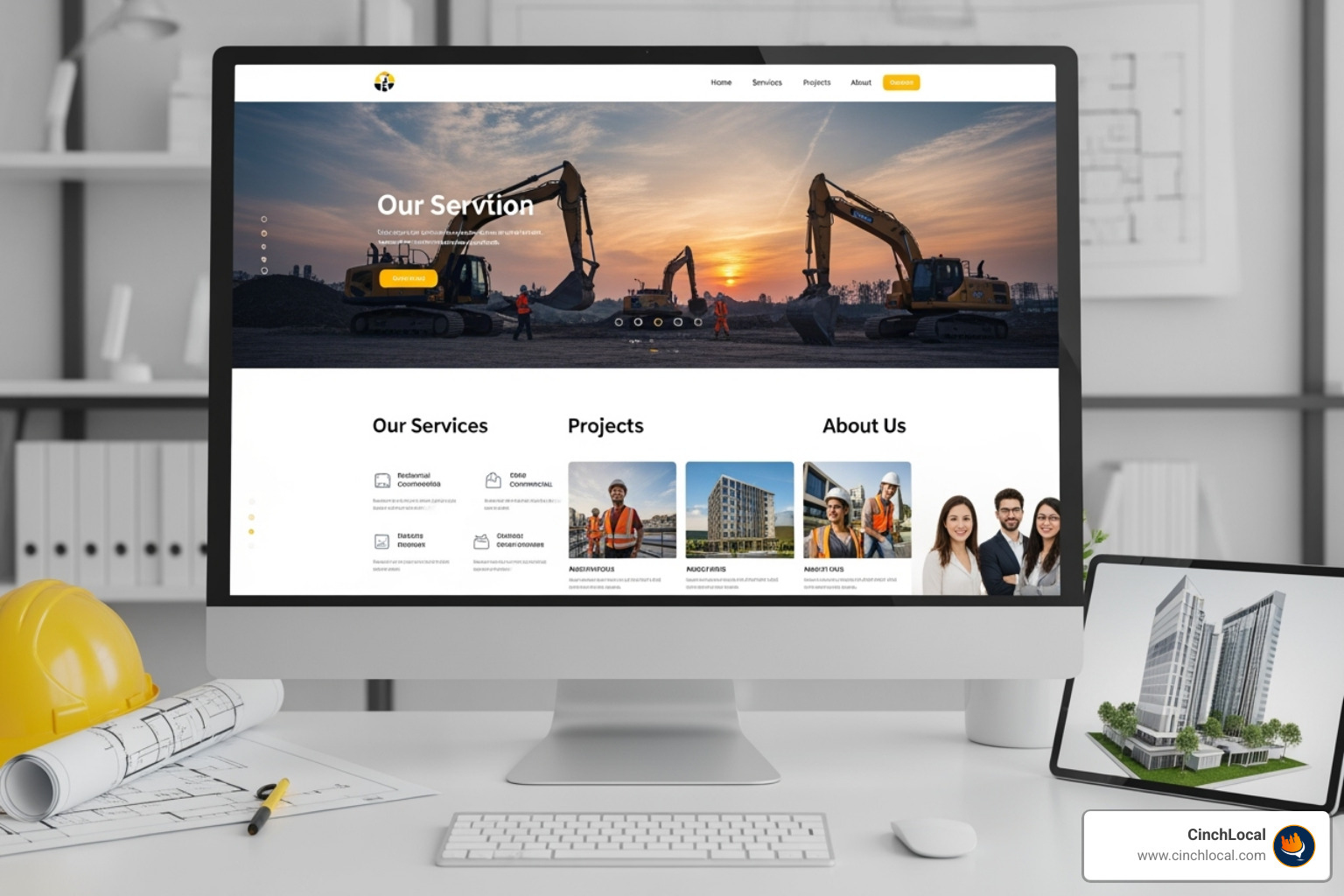
- Mobile-First Design: With 59.16% of internet users browse on mobile , a mobile-friendly site is essential. Google's mobile-first indexing means your mobile site is prioritized for ranking purposes. Your site must adapt seamlessly as users switch between devices.
- Fast Loading Times: Visitors will leave if your site doesn't load in about 3 seconds. This can make or break your lead generation. Image optimization is crucial for compressing large project photos without losing quality. Clean code and browser caching also boost speed.
- Website Security (HTTPS): The padlock icon in the address bar signals professionalism and builds trust. Google also favors secure sites in search rankings, making HTTPS a necessity.
- User-Friendly Navigation: Your site's architecture should be intuitive. Visitors must be able to find your services, gallery, and contact details without frustration. A clear navigation menu accessible from every page is key.
A seamless experience reinforces confidence in your ability to deliver exceptional results on actual construction projects.
The Ultimate Guide to Construction Website Design for Lead Generation
Your construction website design isn't just about looking professional - it's about turning visitors into paying clients. A strategic website works 24/7 to attract qualified leads and grow your business. Every element should guide visitors toward one goal: contacting you for their next project.
How to Optimize Your Construction Website Design to Attract New Clients
Converting visitors requires a thoughtful approach combining smart design with proven marketing tactics.
- Local SEO is your foundation. Dominate local search by ensuring your name, address, and phone number (NAP) are consistent across your site. Create dedicated pages for each service area (e.g., "Kitchen Remodeling in Denver").
- Integrate your Google Business Profile. A well-optimized profile helps you appear in the coveted map results, driving local leads.
- Create helpful content. Answer client questions with blog posts like "What to Expect During Your Home Addition." This positions you as an expert.
- Use strategic keywords. Research what clients search for (e.g., "reliable general contractor near me") and incorporate these phrases naturally.
- Have clear calls-to-action (CTAs). Use bold, action-oriented buttons like "Get Your Free Estimate" instead of passive links. Place them prominently on your homepage, service pages, and after project descriptions. Make your phone number clickable on mobile.
For inspiration, see these examples of roofing websites done right. The same principles apply across construction.
Turning Your Website into a 24/7 Lead Machine
Successful construction websites actively generate leads through smart design.
Place contact opportunities throughout your site, including a prominent CTA on your homepage and project-specific CTAs on service pages. For visitors who aren't ready to call, use lead magnets like a downloadable "Contractor Selection Checklist." This allows you to capture their contact information and nurture them as future clients.
Integrate your site with a CRM system to ensure no lead falls through the cracks. Automating lead entry and follow-up reminders is key, as persistence often wins the project. Finally, track your results with tools like Google Analytics to see what's working and optimize your strategy. A website that brings in just one major client can provide a massive return on investment.
Choosing Your Crew: The Right Approach for Your Construction Website
Building your construction website design is like choosing a construction crew—you need the right team with the right skills. Your website is often a potential client's first interaction with your business, so it must be professional and effective.
Strategic Approaches for Your Construction Website Design Project
You have three main paths for creating your website, each with trade-offs in cost, customization, time, and technical skill.
| Approach | Cost | Customization | Time Commitment | Technical Skill Required |
|---|---|---|---|---|
| Building Your Own Website | Low (initial) | Limited by your skill and platform | High | High |
| Using Customizable Website Templates | Moderate | Moderate (within template constraints) | Moderate | Moderate |
| Partnering with a Professional Agency | Higher (initial investment) | High (custom to your brand and needs) | Low (for you) | Low (they handle it) |
Building your own website seems budget-friendly but is often a costly mistake. The learning curve is steep, and the time you spend on web design is time you're not spending running your business. Most DIY sites end up looking amateurish and fail to generate leads. While a DIY guide for building a website can help, many contractors eventually seek professional help.
Using website templates is a middle ground, offering faster setup than DIY. However, templates force your unique business into a generic mold, making it hard to stand out from competitors using similar designs.
Partnering with a professional web design agency is a strategic investment. An agency specializing in the construction industry understands your business. They provide:
- Industry Expertise: They know how to build trust with your target clients.
- Custom Design: Your site is built around your brand, services, and best projects, ensuring it's unique.
- SEO Integration: Search engine optimization is built-in from the start, helping clients find you.
- Ongoing Support: They handle maintenance, updates, and security, keeping your site performing at its peak.
The initial investment in a professional design pays for itself many times over when it consistently brings in new projects. This approach lets you focus on what you do best while your website works to grow your business.
Conclusion
Your construction website design is the cornerstone of your modern business strategy. Just as you wouldn't cut corners on a client's project, your online presence deserves the same attention to detail and quality craftsmanship.
The blueprint for digital success involves a clear purpose, essential pages, professional aesthetics, optimized performance, and a relentless focus on lead generation. A great website isn't just about looking good; it's a powerful tool that works around the clock to attract prospects, showcase your expertise, and convert visitors into valuable clients.
In an industry where one project can be worth thousands, investing in a website that delivers results is one of the smartest decisions you can make. At CinchLocal, we've seen how the right digital strategy can transform a construction business. A well-designed, strategically optimized website becomes your most valuable crew member - one that never takes a day off.
To ensure your website is built on a solid SEO foundation that attracts qualified leads, explore our expert services for roofing contractors. A professional website isn't an expense - it's an investment in your company's future.
Want Us to Uncover Hidden 'Footprint Gaps' And Critical Blind Spots That’s Quietly Draining Calls, Jobs, and Profits?
Simply Fill Out The Form Below:





